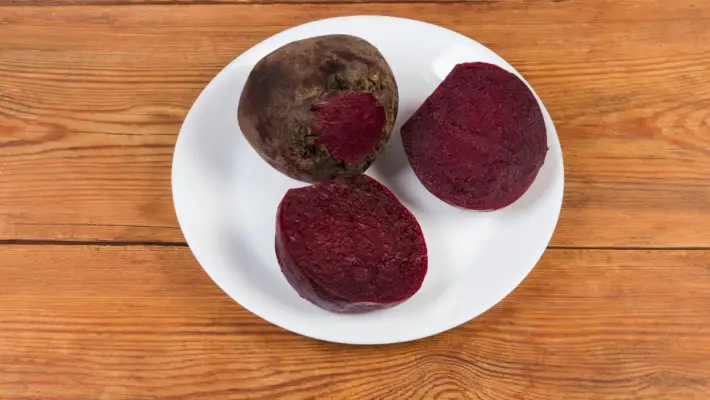Beetroots, also known as beets, are a popular root vegetable packed with beneficial nutrients. Their vibrant purple color comes from betalain pigments, which also provide many health benefits. As beetroots gain popularity in human diets, many dog owners wonder if their canine companions can safely consume them. This article will explore the pros and cons of feeding beetroots to dogs.
An Introduction to Beetroots
Beetroots have been cultivated for thousands of years, first originating in North Africa. They are related to chard and spinach as part of the Amaranthaceae family. The entire beetroot is edible – including the bulbous root, leafy green tops and small clusters of seeds.
These colorful root veggies provide a sweet, earthy flavor. They can be eaten raw, roasted, boiled, pickled or used as an ingredient in juices and smoothies. Beetroots come in a few different varieties, with red and golden being the most common.

Potential Benefits of Beetroots for Dogs
When incorporated into a dog’s diet in moderation, beetroots can offer some impressive health benefits:
- Liver Support: The betalain pigments in beets help support overall liver health and function. The liver is responsible for filtering toxins, so supporting it keeps dogs healthy.
- Improved Digestion: Beetroots contain dietary fiber, which aids digestion and promotes regularity. This helps minimize issues like constipation.
- Immune System Boost: Beets provide essential vitamins and minerals like iron, phosphorus, potassium, folate and more. These nutrients help strengthen the immune system.
- Increased Energy: Beetroots are high in carbohydrates, providing dogs with an energetic boost. The natural sugars are released slowly for sustained energy.
- Better Circulation: Dietary nitrates in beetroots help improve blood flow and circulation. This ensures oxygen and nutrients are delivered throughout the body.
- Muscle Function: The iron content in beets plays a key role in muscle health. It helps muscles properly contract and function for optimal movement.
- Healthy Metabolism: Beetroots contain vitamin B6 which is important for proper metabolism. A healthy metabolism ensures the body optimally processes foods and nutrients.

Are There Any Risks?
While beetroots do come with some great benefits, there are a few things owners should consider before serving them:
- Digestive Upset: Too much fiber from beetroots at once can lead to diarrhea, gas or abdominal pain. Introduce beets slowly and in moderation.
- Kidney Stones: The oxalates found in beetroots may contribute to kidney stone development in some dogs. This is very rare, but owners of prone dogs should limit beet intake.
- Allergies: Some dogs may be allergic or intolerant to beetroots. Look for symptoms like itching, wheezing, skin irritation or vomiting after consumption.
- High in Sugar: The natural sugars in beetroot could cause problems for diabetic dogs. Monitor blood sugar closely when introducing beets.
- Toxicity Concerns: While the levels are low, beets do contain solanine and chaconine which can be toxic. Moderation is key.
How to Serve Beetroots Safely
If you want to share some beetroots with your pup, follow these tips for safe preparation and serving:
- Wash thoroughly and trim green tops and tails. Peel if desired.
- Steam or boil beetroots until soft enough to mash or dice easily. Never feed raw.
- Cool fully before chopping cooked beets into bite-sized pieces.
- Gradually introduce to your dog starting with just a few bites at first.
- Provide plenty of fresh water to help dilute trace compounds and reduce kidney stone risks.
- Limit intake to a few beetroot chunks 1-2 times per week at most.
- Discontinue use if any intolerance symptoms arise.

The Verdict on Dogs and Beetroots
When served properly in moderation, beetroots can be a nutritious supplement to most dogs’ diets. They provide a range of vitamins, minerals and antioxidants that offer health benefits. However, dogs that are prone to kidney stones or have sugar regulation issues should avoid beets to stay on the safe side.
As with new foods, slowly introduce beetroots while monitoring your dog’s reaction. Only purchase high-quality, fresh organic beets for optimal nutrition. If your dog enjoys the sweet, earthy flavor of beets, they can be a colorful and healthy treat in limited amounts. Just be sure to cook them thoroughly and follow the preparation tips covered in this article for best results. Check with your vet if you have any other concerns about incorporating beetroots into your dog’s meals.
Final Thoughts:
- Beetroots provide vitamins, minerals and antioxidants that offer health benefits to dogs.
- Potential benefits include liver support, better digestion, immunity boosts, increased energy and more.
- Avoid feeding dogs prone to kidney stones or sugar regulation issues.
- Cook fully, introduce gradually, and limit intake to 1-2 times per week at most.
- Monitor for any intolerance symptoms and discontinue use if they arise.
- When served properly in moderation, beetroots can be a nutritious supplement for most dogs.










